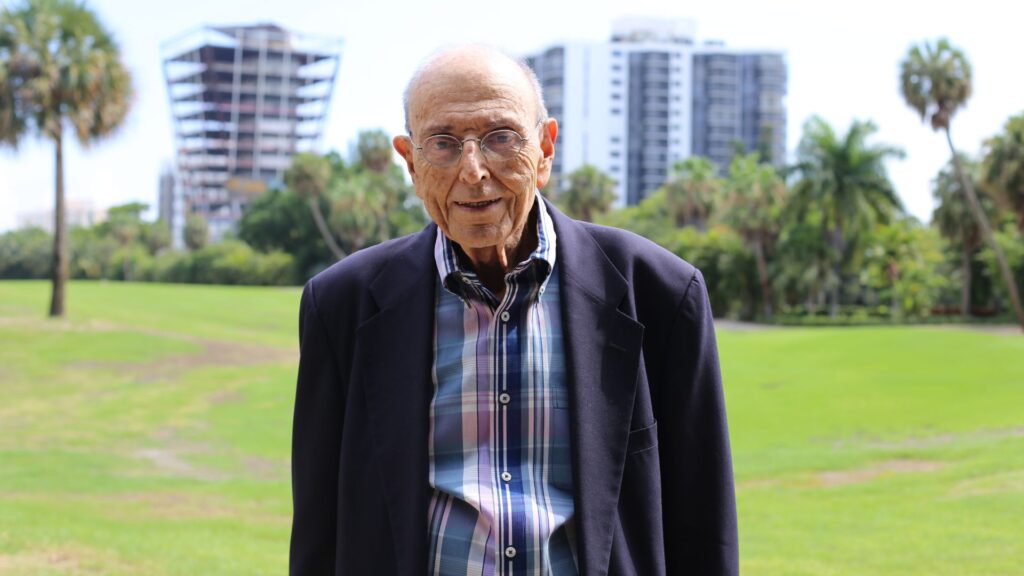Veteran Newsman Retires After 33 Years At MDC
If you’ve taken a class with Merwin Sigale, you’ve likely heard the following question: “What’s your career goal?”
Most of his students answer with clear ambitions-–to become journalists, work in advertising or step into the music business.
But then he throws them a curveball.
“You will not achieve your goal… because you will accidentally stumble into something better.”
That process is known as serendipity, something that has defined Sigale’s entire life.
From his first radio news writing class at the University of Illinois, to stints in Latin America as a news correspondent and co-anchoring the Nightly Business Report on WPBT, to eventually becoming an associate professor at the College, Sigale knows the value of taking chances.
The 90-year-old, who taught journalism at Kendall Campus for more than 33 years, concluded his teaching career in June, although his official retirement day is Aug. 30.
“Merwin was a teacher, a mentor, someone that I think about very much with frequency…he is definitely a gem to education, to journalism,” said Asaad Morales, who was art director at the Catalyst, the former student newspaper at Kendall Campus, in the late-1990s.
The Early Years
Sigale was born in April of 1935 in Chicago, Illinois. When he was 15, he began working as a delivery boy for the Chicago Sun Times, a job that sparked his interest in journalism.
“I would take the top copy of the Sun Times, lay it out on the floor of the building lobby and read it from cover to cover before I ever delivered the rest of them to people’s doorsteps,” Sigale recalled. “I was fascinated by what’s going on in the world.”
His love for journalism led him to the University of Illinois, where he joined the student newspaper, The Daily Illini, in his junior year.
As a senior, Sigale enrolled in a radio news writing course at the University of Illinois Urbana-Champaign at the suggestion of a classmate.
The professor, Donald Brown, who was also the news director of UIUC’s radio station WILL, took interest in Sigale and offered him a part-time position as a newscaster.
Sigale graduated with a bachelor’s degree in journalism in 1957 and a master’s degree in political science in 1960.
Afterward, he spent six months training in Missouri and Texas for a short stint in the Army. During the Vietnam War, men chose between being drafted for two years or serving half a year in active duty and five years in the reserves.
At the end of his service, Sigale returned to Chicago with a plan.
“I went home and I said, ‘Hi Mom, I’m home and I’m leaving for New York,’ because I had decided that the land of golden opportunity for journalists is New York City,” Sigale said.
Chasing His Dreams
In 1960, the budding journalist met with a former classmate in New York who was working at ABC News. He provided Sigale the opportunity to fill in for news writers on vacation.
Sigale quickly moved up the ranks, earning a full-time position as assignment editor for their radio and television programs.
During his time in the Big Apple, the Chicago native had an epiphany.
“After three years at ABC, I went to the news director and said, ‘I’m resigning, I’m going overseas, and I want to cover the world,’” Sigale recalled. “I started looking at Latin America, and I found one place that had, to my knowledge, no American journalists…that was Caracas, Venezuela.”
Sigale spent a year in the Land of Grace, becoming a news manager for United Press International. He also freelanced for Newsweek, ABC News, Reuters, New York Daily News and The Washington Star.
With his newfound expertise, Sigale moved to Miami in September 1964, returning to ABC News as a Latin America correspondent and chief of the Miami bureau.
He covered events including the rise of communism in Cuba and democratic elections in Venezuela.
“Latin America was my concern all through the 70s…but Cuba was the main reason for that,” Sigale said. “Che Guevara led a movement in Bolivia and was killed; I did a lot of writing about that.”
Socialist movements in the Americas began to wane, which marked the end of an era for Sigale. He worked for several publications and radio stations, serving as co-anchor on WPBT’s Nightly Business Report from 1977 to 1980 and as business editor at The Miami News.
In 1981, he received a John Hancock Award for Excellence in Business and Financial Journalism at The Miami News.
Leading A New Generation
Following the closing of The Miami News in December 1988, Sigale took on an opportunity at Miami Dade College as an associate professor in August 1992 and became adviser to the Catalyst.
“You know, I had never really contemplated an academic career, but I found it to be quite appealing,” Sigale said. “This passion for preparing the next generation to carry on the important journalistic tradition kept my interest.”
For 33 years, the veteran journalist taught courses such as basic reporting, editing and makeup and American federal government.
At the Catalyst, Sigale led a team of novice writers, photographers and illustrators who covered MDC.
One article involved the College’s failure, at the time, to comply with regulations set by the Americans with Disabilities Act, including a lack of wheelchair ramps.
“I remember we did a story about how at [MDC] none of the ADA regulations were being followed,” said Alex Kolyer, former photo editor at the Catalyst. “That was probably a story that [Sigale] had to defend from his colleagues…he let us do what we needed to do, and he supported us.”
Sigale oversaw the Catalyst until 2010, when the College’s three existing newspapers—including The Falcon Times (North Campus) and the Metropolis (Wolfson Campus)—merged into The Reporter.

While teaching at MDC, Sigale also served as a copy editor for the Miami Herald for 15 years.
The newspaper aficionado used his experience to teach thousands of students the importance of independent journalism.
“No single person has been more influential to me, not only as a journalist, but as to who I’ve become today as an individual, than Merwin Sigale,” said Albert Siegel, a freelance photojournalist based in Japan who served as editor-in-chief of the Catalyst in the mid-2000s. “He instilled into me a very strong sense of ethics.”
The English and Communications department at Kendall Campus plans to record a one-on-one conversation in mid-August with Sigale, with anecdotes from his career and time at the College to inspire journalism students.
“We’re going to give him the opportunity to leave us with all of his words of wisdom before he moves on to retirement,” said Craig Titus, chairman of the English and Communications department at Kendall Campus.
Click here to subscribe to our bi-weekly newsletter, The Hammerhead. For news tips, contact us at mdc.thereporter@gmail.com.




